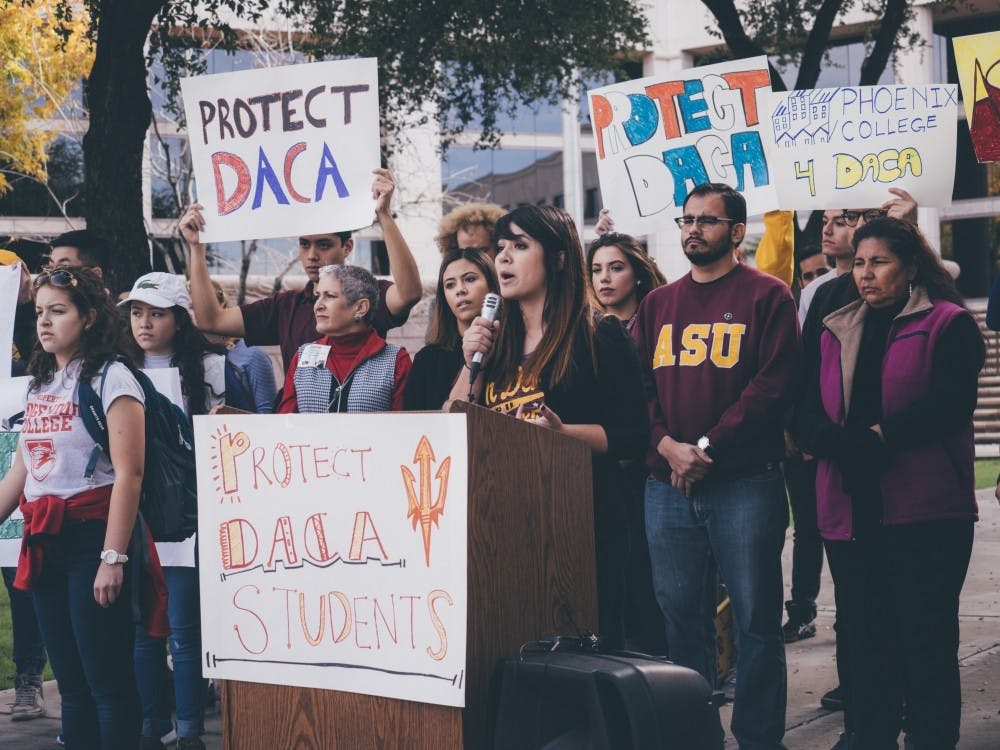Editor's Note: This story has been updated to include comments from ASU President Michael Crow in the fourth and fifth paragraphs.
President Donald Trump terminated Deferred Action for Childhood Arrivals on Tuesday, a program that protected undocumented immigrants brought to the US as children.
DACA offered young immigrants temporary work permits, social security cards, drivers licenses and protection from deportation.
Arizona has roughly 28,000 DACA recipients, 200 of which were enrolled at ASU last school year. The program will be fazed out through October, when the government will stop accepting renewal applications. By March 2018, the nearly 790,000 young people using the program nationwide will lose their legal status.
Tuesday night, ASU President Michael Crow released a 5-step statement about how the university will handle DACA.
"Our contingency planning will include discussions with Mexican and other international universities to identify and develop higher education programs that may be of assistance to our students," the statement read.
DACA was introduced through executive order by President Barack Obama in 2012. When introducing the order in 2012, Obama said the program was not a permanent fix.
He called on congress to pass the DREAM Act, which includes a pathway to citizenship for immigrants like DACA recipients. Opponents of the program label it an executive overreach, a feeling Sessions echoed in his briefing Tuesday morning.
“Such an open-ended circumvention of immigration laws was an unconstitutional exercise of authority by the executive branch,” Sessions said.
Judah Waxelbaum, a political science freshman, agreed with the president's decision, calling it the "right move."
"I think it was unconstitutional in the first place for President Barack Obama to even put DACA into place," he said. "It was the right move to send that back to the legislature."
The DREAM Act, and bills like it, has been introduced in Congress several times since 2001 with no success. In his decision, President Trump gave Congress six months to do what they have failed to do for 16 years – pass an immigration reform bill granting childhood arrivals legal status.
On Tuesday, the president tweeted that he would "revisit" the issue if Congress is unable to produce a DACA bill in that period.
Rep. Isela Blanc (D-Tempe), an ASU alumna, said she sympathizes with DACA recipients. She came the U.S. illegally at age six from Guadalajara, Mexico. But when she was teen, the Immigration Reform and Control Act was passed.
“When I was entering my teenage years in 1986, President Ronald Reagan – a Republican – and his congress passed a pathway to citizenship,” Blanc said.
The act granted legal amnesty to any immigrant who arrived in the country before 1982.
Edder Martinez, a journalism senior and DACA recipient, said the weeks leading up to the Sep. 5 deadline were both physically and emotionally exhausting.
“I work full time and I also go to school full time. And then I’m involved in student government," Martinez said. "In addition to all the worries I already have at school, now I have to worry about potentially not being able to do all the things that I am currently doing. It's been really difficult."
In 2015 the Arizona Board of Regents began offering in-state tuition to DACA recipients, following a two-year legal battle between the state of Arizona and Maricopa County Community Colleges. The courts sided with the MCC system, stating that DACA granted the students temporary legal status and that they qualify for in-state benefits. Without the program, DACA students at ASU could see their tuition almost triple assuming they are charged the same as international students.
But in a November statement, ASU President Michael Crow pledged his to commitment to DACA students, saying “If DACA is eliminated we will rise to the challenge.”
“If students lose the status that makes them eligible for in-state tuition, ASU will convene and engage the community on this issue to seek financial support for the continued study of students at ASU who graduated from Arizona high schools and who are qualified to attend the state universities — regardless of their immigration status,” Crow said in the statement.
With DACA gone, Martinez said ASU can rise to the challenge by being “proactive instead of reactive.”
“What then need to do is have some sort of scholarship fund available for us to be able to continue our education," Martinez said. “Many of us have gotten private scholarships, but obviously were going to need to to fill a bigger gap now if we do not qualify (for) in-state tuition if DACA is removed.”
Belen Sisa, a political science senior and DACA recipient who refers to herself as “undocumented and unafraid,” said DACA recipients will not go back into hiding.
“We will not stand down anymore,” Sisa said. “We will determine our own futures and we will no longer live on this roller-coaster.”
State Press Politics Reporter Chase Budnieski contributed to this story.
Reach the reporter at brookehanrahanreports@gmail.com and follow @brookehanrahan1 on Twitter.
Like The State Press on Facebook and follow @statepress on Twitter.




